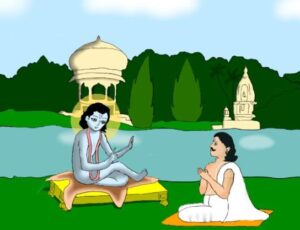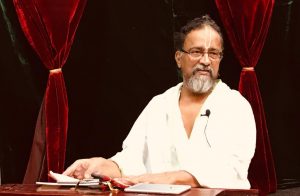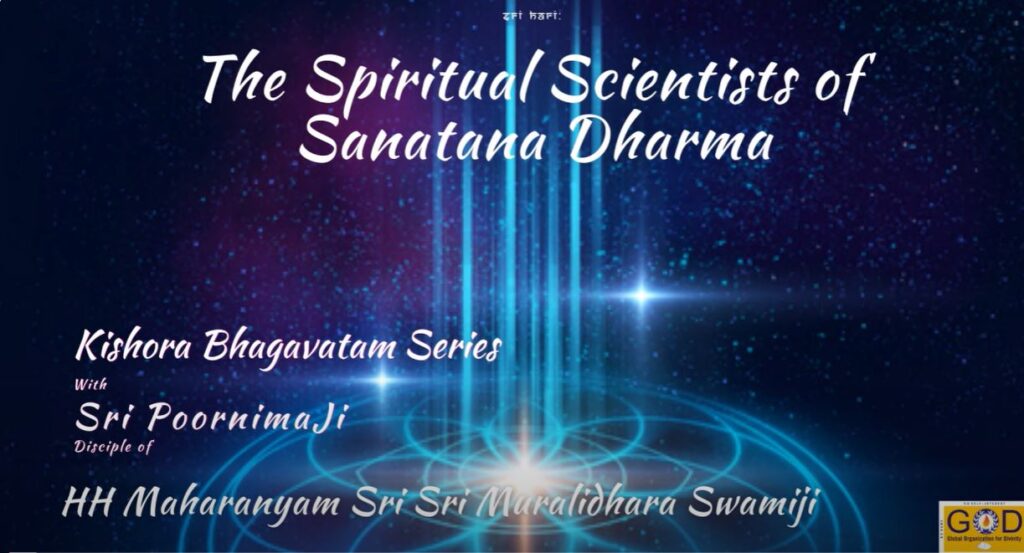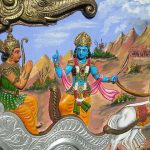“All excellences like truth, cleanliness, forbearance, kindness, longevity, memory and strength will decay.
A man’s worth will be estimated only with wealth rather than with virtuousness and character. Might will become right, being accepted as the factor determining what is dharma and what is justice. Business will become tantamount to the practice of fraud.
External marks will become the only insignia of ashrama (brahmacharya, gruhastya, sanyasa, etc.) in life. Brahmacharins will live contrary to their vows and will have no sense of purity. Householders will cease to give holy alms. Ascetics will become residents of villages and Sanyasins will be very greedy. The Veda will be perverted by atheists.
If a man is a master of empty, fancy and even abusive vocabulary, he will be considered a scholar. Ostentation and show will become the hallmark of character. Well-dressed hair will become the criterion of beauty. Mutual attraction will become the sole consideration in marital relationship. Mating will be looked upon as marriage. Bathing will be significant only hygienically and not ceremonially.
Men will live to eat, not eat to live. A man who maintains his family by hook or crook will be considered resourceful and respectable. Men will be dull and narrow in outlook, luckless, gluttonous, poverty-stricken and extremely lustful. Thieves will lead the country.
Men will adopt prohibited means of livelihood as honorable and righteous even when there is no danger in social life. Cows that have become old and unproductive will be disposed off. Men who are authorities on adharma will begin to interpret Dharma, sitting on the sacred seats of respected teachers.
For a pittance people will quarrel, abandon all bonds of affection and fight with the nearest kith and kin, and even kill each other. People will fail to take care of even their old parents.
A holy tirtha will mean only water at a distance. Dharma and charity will be observed solely for reputation. Carried away by the arguments of atheists, men will generally not adore the worshipful Achyuta, the Father of all the worlds!”
Does this sound like a description of our own society?
This is the vivid picture of the ‘future’ in the Age of Kali painted by the great sage Shuka to King Parikshith, towards the end of his seven-day exposition of Srimad Bhagavata Mahapurana. How accurate he was! We know… because we are here to experience it. One look at our own lives is enough to know Sri Shuka was right. Another look at the world around us will leave us with absolutely no doubt that we are living in the Age that he described.
Where were we and where are we now? The great culture that once had purity, truth, austerity and compassion as its pillars, now reduced to this!

But we are not to blame. Sri Shuka himself says in the same breath that living beings, who are born in the world in the cycle of four ages of Krita, Treta, Dwapara and Kali, will be influenced by the spirit of the age in which they belong. And Kali’s spirit is one of selfishness and ostentation, of corruption and sensuality, of dishonesty and fear. How can we, mere leaves tossed about on the gigantic waves of Time, fight against that immense force?
Is there no hope then for us?
How can there not be! Will the Lord, who is the one who infuses each Age with its spirit, not give a solution simple enough for his struggling children to overcome the overpowering ills of Kali?
Sri Shuka says further in Srimad Bhagavatam, “When the Lord enters into the heart of a man, all the evil in him is destroyed, just as the discoloration of gold by contact with other substances is removed only by heating it in fire.”
But then that is easily said than done. How can we tottering babies usher the great Lord into our hearts when our minds are pulled in so many directions by our weak senses and the ‘attractive’ ways of the world?
For this too, Sri Shuka says, “By being heard about, hymned about, and adored, the Lord enters into the heart of man.” Hence it is through kirtanam (chanting His names and singing His praises), shravanam (listening to His stories and praises), and worship (prayer), that the Lord enters the heart. The Divine Name of the Lord and His stories shall indeed deliver us from the evil ways of the modern age.
That’s great and very nice to read about. But how can we be inspired to actually practice all this?
The answer is also above: through prayer.
With deep prayer and yearning to come out of the mire of this life and the world, the Lord sends a Guru to inspire us. It is only through satsanga (association) with this Guru that this can be achieved. A true Guru is the savior who can inspire us to chant the Names of God, listen about the Lord, and install Him in our hearts.
King Parikshith had Sri Shuka. With deep, heartfelt yearning like Parikshith’s, we too will be inspired by our Savior.







Awesome Nishaji. Simple and to the point!
RADHE RADHE! Wonderful description!